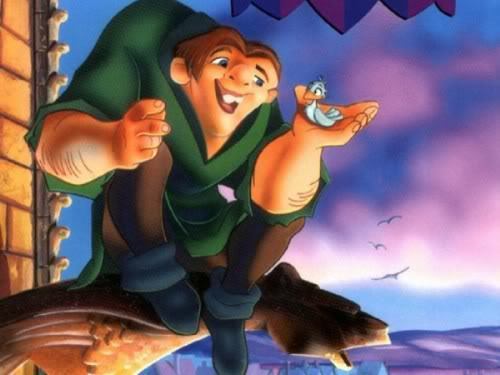While reading Martin Norden's "'You're a Surprise from Every Angle': Disability, Identity, and Otherness in The Hunchback of Notre Dame," I was very surprised by his opinion of a stereotype in Disney. Norden seems to think that even the use of what can be considered a positive stereotype is something Disney should avoid. He writes, "By reducing the Hugo narrative to a Beauty and the Beast level, the filmmakers thus fell back on one of the most enduring beliefs about "good" [people with disabilities]: that they possess an inner beauty that compensates for their less-than-perfect exteriors. Though presumably well-intentioned, such a simplistic belief represents stereotyped thinking at its most insidious..." (Norden 166). Norden's negative language here implies that he is against Disney's use of this stereotype, even though it seems to imply something positive about people with disabilities. I suppose its fair to say that any stereotypical thinking is something that society should avoid, but in this case I don't think Disney should be criticized. I can't think of any circumstances in which children believing that deformed people are kind would be a bad thing, except for maybe if they are somehow hurt from approaching someone who is deformed in reality who is not very nice. Disney tends to use stereotypes in their films to make things simpler for their young audience, and this stereotype does not seem like a bad one at all.
Yet, if you still think that even this stereotype should not be used by Disney, it should relieve you to know that apparently children do not pick it up from the movie. The 2010 Pacific Standard article "In Disney Films, Disney is Far from Beastly" by Tom Jacobs describes a small experiment done on children to study the influence that beauty stereotypes portrayed by Disney had on them (Jacobs). Children from ages 6 to 12 were split into two groups; one half watched Cinderella and the other half watched The Hunchback of Notre Dame (Jacobs). After the showings, the children were shown pictures and asked questions such as "How nice do you think this person is?" (Jacobs). It was discovered that children "'reported an overall greater desire to befriend an attractive peer... [and rated] the child [in the photograph]...as nicer relative to an unattractive peer...no matter which film they had just watched'" (Jacobs). While it is sad that this is the case, it appears that these children's desire to befriend more beautiful people was no affected by Disney films. Of course, this study was a small one and is not sufficient to constitute a pattern, but it does suggest that Disney might not have the negative impact on children that many critics claim it does.
Works Cited
Jacobs, Tom. "In
Disney Films, Beauty Is Far From Beastly." Pacific Standard. Pacific Standard, n.d. Web. 29 Oct. 2013.
<http://www.psmag.com/culture-society/in-disney-films-beauty-is-far-from-beastly-25119/>.





